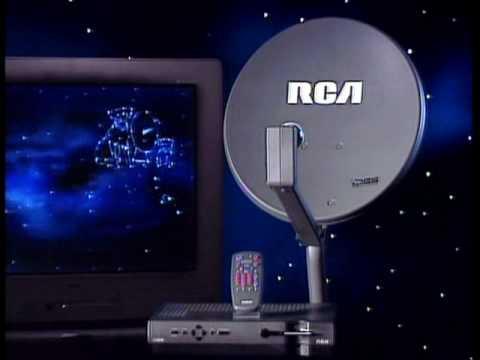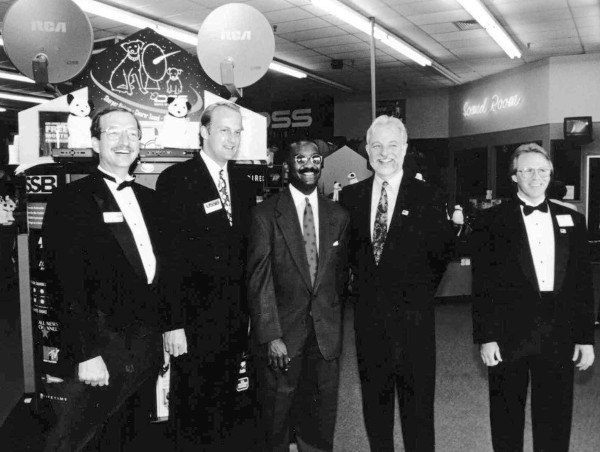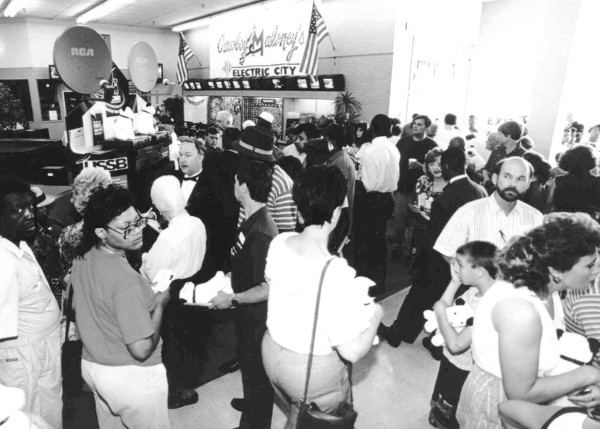hey, I bought into Direct, many of us did, but a few years back I couldn't stomach it anymore. Got tired of the crummy customer service and high prices. I do not watch sports and the sports kept making my price go up. Eventually way over $100 per month with no premium content at all, just a lot of commercials. I repeatedly tried to get the sports content cut and my bill in return but they would never do it. I kept seeing new customer perks but when I asked they would say nope, even though I was a customer for 17 years. I finally got fed up (really upset my teenage daughter) and told the lady on the phone I wanted to quit. Then they got serious, even offered to get this, CUT THE SPORTS(!) and half my bill, plus upgrade me to some premium content and upgrade my equipment. I asked why now? I said, too late people, much too late. They asked what I was going to do, and I replied, "None of your business lady!". They even 2+ years later try to get me back, but I have found that I have more free time as I am not addicted to useless programing, most of which had gone down in quality (example, the History Channel!!! Need I say more?) People, I read more, my wife and I talk to each other more we go for longer walks in the fresh air. Cutting DTV was the best thing I have done in years! My wife wanted something, so I popped for $15 a month for Netflix, but I rarely even watch that, but when I do, I have a vast choice of COMMERCIAL FREE material when I want it. Plus, more of what I want it there. How can they offer me an obvious much greater service at $100 a month less? I think more and more people are starting to figure this out, at least those of us who are not brain dead from reality TV. Goodbye DirectTV, your time has come and gone. I would say RIP, but I could care less about you, just like you didn't care about me.
25 Years Ago Today: DirecTV Is Born

Pondering this dilemma in early 1994, Lemoyne read about a new satellite TV system called DirecTV. DirecTV promised 150 channels of all-digital laserdisc-quality TV with CD-quality sound, transmitted via the Ku satellite band (DVD was still three years in the future).
Lemoyne was familiar with satellite TV — three million subscribers at that time received their TV via C-band satellite. But C-band required a receiving dish larger than a swimming pool. In 1991, PrimeStar had launched a Ku-band service known as DBS (Direct Broadcast Satellite), but even this system needed a three-foot-diameter dish.
DirecTV’s dish, however, measured a mere 18 inches across and could be conveniently mounted on a window sill. It was as The New York Times put it, “a saucer that would scarcely do as a respectable birdbath.” DirecTV was also an all-digital system when all other TV was lower-quality analog.
Intrigued, Lemoyne called a buddy, Eddie Maloney, one of three brothers who owned Cowboy Maloney’s Electric City, Lemoyne’s hometown electronics retailer in Jacksonville, Mississippi. Lemoyne, sales manager of the local Lexus dealership, had sold Eddie and his brothers, Con and Johnny, several cars over the years. Eddie told Lemoyne that Cowboy Maloney’s would be the unlikely site of DirecTV’s national launch six months hence. Eddie then asked Lemoyne if he wanted to be the first to buy the new satellite TV system when it became available in the spring. “I’m in!” Lemoyne excitedly replied

So, on a sweltering Friday morning, June 17, 1994, Lemoyne Martin strode past a queue of around 150 other potential buyers and a phalanx of media at Cowboy Maloney’s 1-55 North store. He handed over nearly $1,000 to tuxedo-clad salesman, Ty Carney, and became the first DirecTV owner and first all-digital TV service subscriber.
The Early Days of Satellite TV
While the government and broadcasters increasingly used satellites to distribute TV signals throughout the 1960s and 1970s, it wasn’t until 1980 that consumers were able to buy their own enormous C-band satellite TV receiving dishes. In 1981, Minnesota TV station owner Stanley S. Hubbard and his sons Stanley E. and Robert founded United States Satellite Broadcasting (USSB). Certain that the satellite TV business would be big, in 1991 the Hubbards bought five transponders on General Motors’ Hughes Aircraft broadcast satellite for more than $100 million to start their own satellite TV business.
Around the same time, another consumer satellite TV enthusiast, Eddy Hartenstein, was named president of a new Hughes-owned subsidiary to develop direct-to-home satellite TV service with USSB using the higher-frequency Ku-band. Hartenstein assembled an executive team and created DirecTV. Neither USSB, General Motors nor Hughes were consumer electronics companies, however, so a call for bids was sent out in late 1991 to find a consumer product partner.
In the early 1990s, RCA was in flux, a fading but still formidable brand just recently bought by French conglomerate Thomson. Long-time ebullient RCA sales and marketing executive Joe Clayton engineered an RCA renaissance by, among other things, resurrecting the company’s long-dormant “His Master’s Voice” icon featuring a dog named Nipper and adding the puppy Chipper for marketing and advertising. To Thomson’s surprise, RCA won the DirecTV bid.
A two-and-a-half-year crash-development effort followed. DirecTV would become the first all-digital TV system and the first small-dish DBS system as well as the first commercially-available consumer product to utilize the new MPEG-2 video compression standard. On December 17, 1993, Hughes launched the first DirecTV satellite.
Only one question remained for Clayton: where and how to launch DirecTV.
Satellite was seen as a rural solution, able to deliver TV service where cable couldn’t and wouldn’t go. So Clayton sought a retailer with a large but largely rural customer base with an educated sales staff that would be able to explain and sell this exotic new technology.

Although largely unknown outside of Mississippi, Cowboy Maloney’s was and is a prominent multi-store electronics superstore and, at the time, a prime RCA customer. At CES 1994, Con Maloney saw the DirecTV prototype and proclaimed to Clayton that the service “was going to be the biggest thing ever and that he could count us in.” Clayton asked if Con wanted Maloney’s to be the first to sell the revolutionary system. Con, of course, said yes.
The Digital TV Revolution Was Televised
The DirecTV system Lemoyne Martin bought cost $699 (plus installation) for a dish and receiver. Service started at $21.95 a month, and subscribers could access up to 75 digital basic and pay channels, a number that would double when Hughes launched a second DirecTV satellite in August 1994.
DirecTV was an almost instant success. Clayton and RCA rolled out DirecTV to ever-larger markets until it was available nationwide in November. By June 1995, more than a million subscribers had signed-up. More important, DirecTV’s all-digital success, coupled with the digital TV standards set by the HDTV Grand Alliance 18 months later, sparked the digital TV revolution that resulted in a market ready for DVD, flat-panel TVs, and high-definition TV, culminating in the end of analog TV on June 12, 2009.
DirecTV soon had competition. USSB launched its own DBS service soon after DirecTV. In 1987, C-band satellite entrepreneurs Charlie Ergen and Jim DeFranco applied to the FCC for a direct broadcast satellite (DBS) license, which was approved in 1992. Dubbed DISH, Ergen’s service began broadcasting in March 1996. In 1998, DirecTV bought USSB and, a year later, PrimeStar, combining all three to permanently establish its satellite TV primacy. Now owned by AT&T, DirecTV boasts nearly 24 million subscribers, more than any individual pay-TV service provider in the U.S.
Lemoyne Martin remained a DirecTV subscriber until last year. As a hedge against annoying weather outages, especially during NFL games, the Martin home maintained both DirecTV and basic cable subscriptions. Tired of paying two TV bills, Lemoyne switched to cable. But he still shops at Cowboy Maloney’s.
1994 ad introducing the RCA Digital Satellite System:
- Log in or register to post comments

I worked in the "two-and-a-half-year crash-development" on the program guide and various system integration issues. Key developments to the success of this system was due to (1)high power satellites allowing for small dish size (2)integrated circuits to encode video/audio into MPEG-2 stream. In development, we had racks of circuits to do the encoding for a single channel and this was not feasible for a system of hundreds of channels - necessitating the development of integrated circuits for encoding. This was an asymmetric system where the MPEG encoding was done by expensive, powerful chips and the decoding in the customer receiver was done by a less expensive chip.

I respect all you guys and the truly great tech miracles that you performed, I just thought the management boys got too big for their britches. Happens all the time, a company corners the market and then gets smug. Sooner or later something better will bring them down. I originally loved DTV, it seemed like science fiction at the time for this country boy, but the awe wore off after the years went by and the cost doubled, then doubled again, finally doubling again after that. I saw the stock reports, those owners were not having to eat cat food, they didn't have to bump the costs that high that quickly, they just got greedy.

I to jumped on the Directv bandwagon, at the 1 year mark when Directv's exclusive contract with RCA was up. I wanted SONY receiver and dish.$1200 in 1995. Nfl Sunday ticket was the clincher for me, being a Miami Dolphins fan stuck in the cornfields of Iowa. $69 a year back then. I finally left Directv behind a few years ago after 19 years. Like the above gentlemen mentioned, they just kept raising the prices, Sunday ticket was I believe $440 at the time I left. Pretty pricey when all the games are on at the same time.When I look back at all those years of $120/mo or more, plus the additional Sunday ticket cost over 19 years, wow. And they continue to shade their long term customers, trying to attract new money.I miss my football, but now I watch at the sports bars, with a food and drink bill that's still way less than I was shelling out for Directv. Bring it back to $45/mo, I'd be the first to sign up....but never again at your current prices.We have options.

In less then 20 years the cost rose ten fold? How can that be justified? Is the greed Direct TV or is it the over the top cost of pro sports these days? Of course we live in a world where billionaire owners con/extort local governments to fork over upwards of a billion dollars towards fancy new stadiums that really aren't needed and to pay for it they cut needed programs and other more reasonable expenditures. We live in a world wher an average pro sports player (just an averag one, not a stand out) makes more money then the average brain surgeon. What does that say about society that we are allowing this to happen? Hey, I like sports as well as the next guy, but the costs have gotten out of hand. As I noted above, I blame the cost of sports for my extravagant bill st DTV. (at least, mostly, I am sure DTV was greedy too). Making non sports lovers supplement the costs is wrong (though I see you also paid for football, huh?) If DTV offered ala cart programming at a reason able price, I might return, but then again, really, what is all that good? It took being without it to see that I didn't need it. Do I miss some things? Sure, esp 24 a day news if something is going on, but even that is pretty repetative. Again, as far as sports, we need to rethink the whole thing in this country, and de emphasis i. Young people spend too much time on it and not their studies. The hero worship of often questionable players is wrong. (Many can't even stay out of jail, yet because they make owners money, they are welcomed back on the field) The costs of seeing a game in person is absurd. 50+ years ago, my Dad used to take me to see the Minnesota Twins play at the old Met Stadium. It was cheap, we did it often, ate hot dogs. Now, it is crazily priced, plus even the parking is crazy, parents unless they are hedge fund managers can't take the kids to to many games. Time to rethink the money in pro sports, and not just for the cost of "cable" TV, but for the good of over all society.



















































